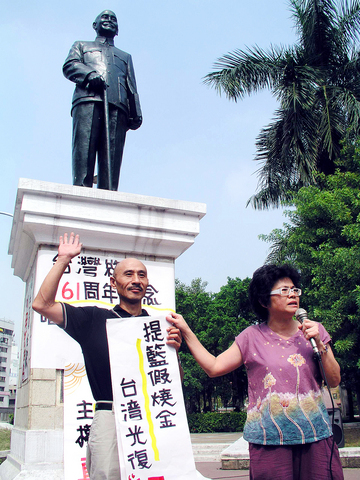A throng of pro-China demonstrators gathered outside the Ministry of the Interior yesterday to demand that the government designate Retrocession Day as a national holiday.
Retrocession Day celebrates the end of the Japanese colonial period in Taiwan on Oct. 25, 1945, as well as the conclusion of the Sino-Japanese War (1937-1945), and is observed by Chinese worldwide.
"We need to remind the government of the importance of Retrocession Day -- of the more than 30 million Chinese who died at the hands of the Japanese military in China, and of the many who suffered under Japanese colonial rule here in Taiwan," said Tang Shu (

PHOTO: YU HSUEH-LAN, TAIPEI TIMES
Retrocession Day used to be a national holiday, but has not been observed since 2001 as the government has instead pushed for two-day weekends.
Luo Su-chuan (
Maggie Cheng (
"But we're not associated with the current anti-President Chen Shui-bian [陳水扁] campaign," Cheng added, despite the fact that numerous protesters wore "Depose Chen" baseball caps.
Shu, meanwhile, denounced Chen for not enshrining a holiday that was important to ethnic Chinese, adding that the US was pitting the Taiwanese and Chinese against each other to maintain its own hegemonic interests and a lucrative trade in weapons to Taiwan.
"The Americans don't like symbols of cross-strait unification such as Retrocession Day because they need to promote cross-strait enmity in order to sell their weapons," Tang said.
Tang added that although China has deployed more than 800 ballistic missiles on the east coast, "very few of the missiles actually target Taiwan."
Although the US was frustrated with a long-stalled arms package in the Legislative Yuan, US arms dealers were scrambling to sell other weapons to the country, Tang said.
Meanwhile, on a related issue, the Taiwan Society last night held an indoor rally in Kaohsiung to expand the "local culture movement," an event that the organizer hoped would counter the "misconceptions" about local culture and national identity created by the Chinese Nationalist Party's (KMT) "colonial culture" in the post-World War II period.
Yang Wen-chia (

A preclearance service to facilitate entry for people traveling to select airports in Japan would be available from Thursday next week to Feb. 25 at Taiwan Taoyuan International Airport, Taoyuan International Airport Corp (TIAC) said on Tuesday. The service was first made available to Taiwanese travelers throughout the winter vacation of 2024 and during the Lunar New Year holiday. In addition to flights to the Japanese cities of Hakodate, Asahikawa, Akita, Sendai, Niigata, Okayama, Takamatsu, Kumamoto and Kagoshima, the service would be available to travelers to Kobe and Oita. The service can be accessed by passengers of 15 flight routes operated by

Alain Robert, known as the "French Spider-Man," praised Alex Honnold as exceptionally well-prepared after the US climber completed a free solo ascent of Taipei 101 yesterday. Robert said Honnold's ascent of the 508m-tall skyscraper in just more than one-and-a-half hours without using safety ropes or equipment was a remarkable achievement. "This is my life," he said in an interview conducted in French, adding that he liked the feeling of being "on the edge of danger." The 63-year-old Frenchman climbed Taipei 101 using ropes in December 2004, taking about four hours to reach the top. On a one-to-10 scale of difficulty, Robert said Taipei 101

MORE FALL: An investigation into one of Xi’s key cronies, part of a broader ‘anti-corruption’ drive, indicates that he might have a deep distrust in the military, an expert said China’s latest military purge underscores systemic risks in its shift from collective leadership to sole rule under Chinese President Xi Jinping (習近平), and could disrupt its chain of command and military capabilities, a national security official said yesterday. If decisionmaking within the Chinese Communist Party has become “irrational” under one-man rule, the Taiwan Strait and the regional situation must be approached with extreme caution, given unforeseen risks, they added. The anonymous official made the remarks as China’s Central Military Commission Vice Chairman Zhang Youxia (張又俠) and Joint Staff Department Chief of Staff Liu Zhenli (劉振立) were reportedly being investigated for suspected “serious

Taiwanese and US defense groups are collaborating to introduce deployable, semi-autonomous manufacturing systems for drones and components in a boost to the nation’s supply chain resilience. Taiwan’s G-Tech Optroelectronics Corp subsidiary GTOC and the US’ Aerkomm Inc on Friday announced an agreement with fellow US-based Firestorm Lab to adopt the latter’s xCell, a technology featuring 3D printers fitted in 6.1m container units. The systems enable aerial platforms and parts to be produced in high volumes from dispersed nodes capable of rapid redeployment, to minimize the risk of enemy strikes and to meet field requirements, they said. Firestorm chief technology officer Ian Muceus said